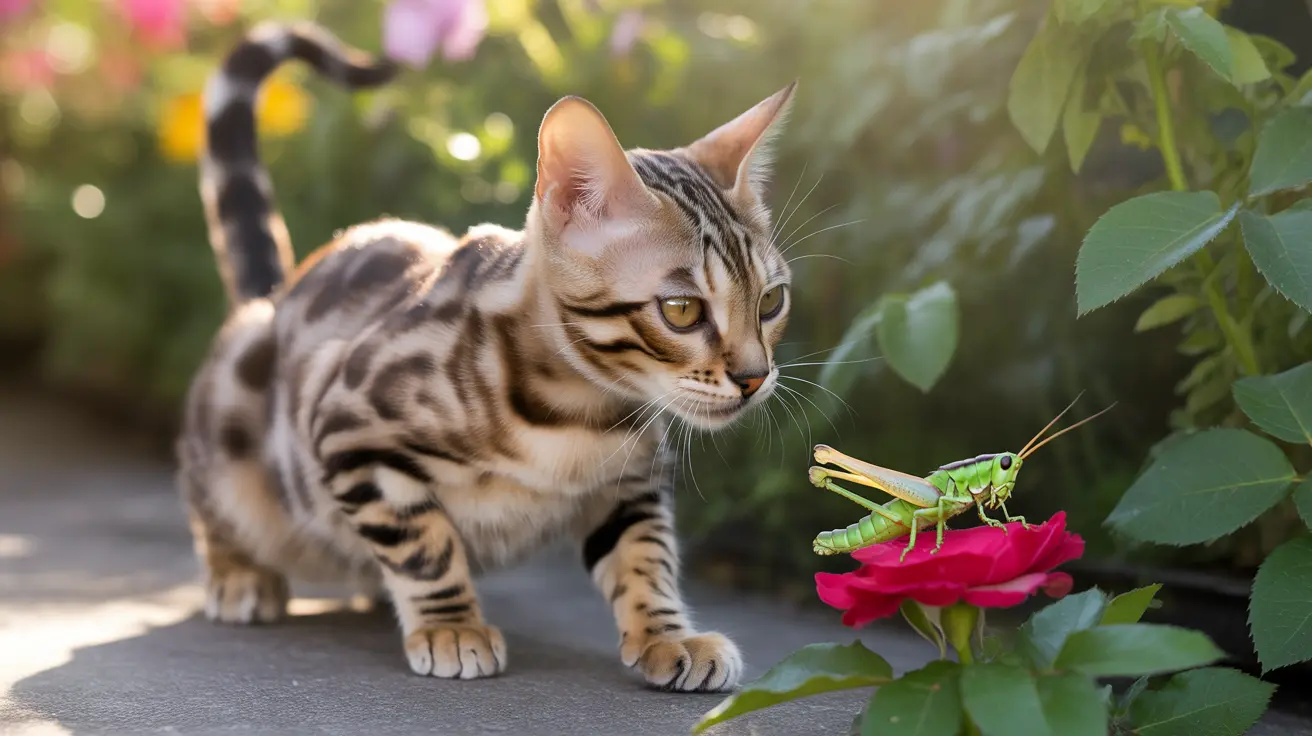Safety of Cats Eating Grasshoppers
Generally speaking, grasshoppers are non-toxic to cats, and occasional consumption is unlikely to cause harm. However, there are several important safety factors to consider:
Immediate Safety Concerns
The tough exoskeleton of grasshoppers can be difficult for cats to digest, potentially causing mild gastrointestinal discomfort. While most cats can handle eating one or two grasshoppers without issues, consuming multiple insects might lead to stomach upset or vomiting.
Pesticide Risks
The most significant danger comes from grasshoppers that have been exposed to pesticides or other harmful chemicals. These toxins can cause serious health issues in cats, making it essential to prevent your cat from hunting in areas where pesticides are used.
Nutritional Value and Health Benefits
While grasshoppers shouldn't be a primary food source for cats, they do offer some nutritional benefits:
- High protein content
- Rich in essential amino acids
- Good source of minerals like calcium and iron
- Contains beneficial fatty acids
Potential Risks and Complications
Digestive Issues
Some cats may experience these symptoms after eating grasshoppers:
- Vomiting
- Diarrhea
- Temporary loss of appetite
- Abdominal discomfort
Parasitic Concerns
Wild insects can potentially carry parasites or bacteria that could affect your cat's health. While this risk is relatively low with grasshoppers compared to other insects, it's still a consideration worth noting.
When to Contact Your Veterinarian
Monitor your cat closely if you've observed them eating grasshoppers. Seek veterinary attention if you notice:
- Persistent vomiting or diarrhea
- Lethargy or unusual behavior
- Loss of appetite lasting more than 24 hours
- Signs of allergic reaction
Prevention and Management
To minimize risks associated with grasshopper consumption, consider these preventive measures:
- Keep your yard free from harmful pesticides
- Provide plenty of engaging toys to satisfy hunting instincts
- Consider an enclosed outdoor space or "catio" for safer outdoor time
- Maintain regular feeding schedules with appropriate cat food
Frequently Asked Questions
Can cats safely eat grasshoppers, or are they harmful to my pet?
Cats can safely eat the occasional grasshopper, as they are generally non-toxic. However, it's best not to encourage this behavior due to potential risks from pesticides or digestive issues.
What should I do if my cat eats multiple grasshoppers and shows signs of stomach upset?
Monitor your cat closely and ensure they have access to fresh water. If symptoms persist for more than 24 hours or include severe vomiting or lethargy, contact your veterinarian.
Are there any risks of pesticide poisoning if my cat catches and eats grasshoppers outside?
Yes, there is a risk of pesticide poisoning if grasshoppers have been exposed to chemical treatments. Keep cats away from areas where pesticides are used and watch for symptoms of toxicity.
How nutritious are grasshoppers compared to regular cat food proteins like chicken?
While grasshoppers are high in protein and certain nutrients, they don't provide the complete balanced nutrition that cats need. Commercial cat food remains the best primary food source.
Should I try feeding my cat insect-based commercial foods containing grasshopper or cricket protein?
Commercial insect-based cat foods can be safe alternatives, as they're properly processed and balanced. However, consult with your veterinarian before making any significant changes to your cat's diet.
Conclusion
While cats can generally eat grasshoppers without serious consequences, it's important to monitor their behavior and be aware of potential risks. Focus on providing a balanced, commercial diet while taking steps to minimize exposure to potentially harmful insects or pesticides.






